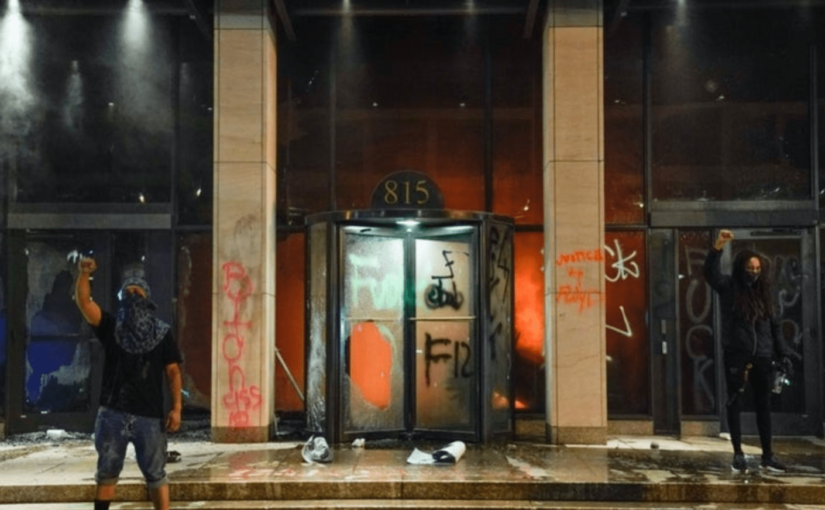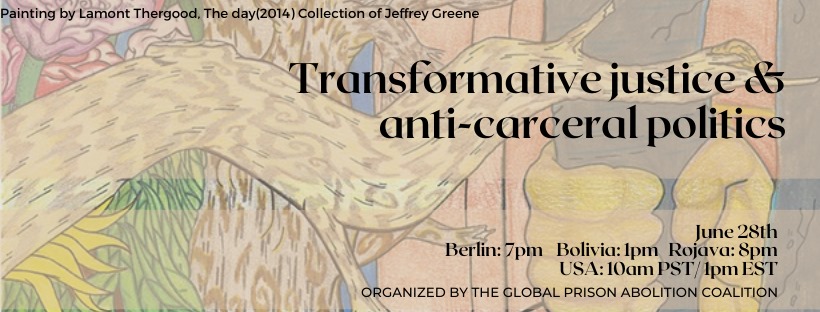By Robert Cuffy
Featured image, of a burning AFL-CIO headquarters in Washington, D.C., during protests on May 31, courtesy Evan Vucci/AP
Originally Published on Abolition Journal
“Knowing my brother is to love my brother.
“He’s a gentle giant, he don’t hurt anybody.” – Philonise Floyd.
The history of international capitalism is indissolubly bound up with the oppression of people of African descent. In the United States, Black people’s daily lived experiences are emblematic of the double edged sword of class exploitation and social oppression. Whereas in Britain the modern police force can trace its heritage back to strikebreaking thugs, in the United States the modern police force is directly descended from the slave patrols which terrorized slaves seeking freedom.
As the status of Black people in the US changed from slaves to “free” laborers through the heroic struggle of slave rebellions and the abolitionist movement, the slave patrols went through a parallel transformation into modern police officers who were employed not by individual plantation owners but by local, state and the federal government. These police officers, like their partners across the pond in Britain, also played a key role in suppressing labor struggles and today remain the government’s favored strikebreakers.
Time and time again, as Black people have stood up for their rights in the United States, they have been met with exceptionally brutal and murderous responses from the government. Yet such violence is not reserved solely for periods of upsurges in the Black struggle, it is embedded into the daily fabric of Black life.
The May 25th murder of George Floyd by the Minneapolis Police Department (MPD) , for the alleged crime of using counterfeit currency, is a prime example of the fact that Black people live heavily policed lives with the ever present possibility of being murdered at the drop of a dime. Watching the footage of MPD officer Chauvin kneeling on Floyd’s neck for eight full minutes should fill the average person with a burning rage due to the callous indifference shown to George’s life. It is this burning rage which the Black youth of Minneapolis unleashed upon targets in their city which were identified with the daily oppression.
Minneapolis’ Black youth held protest rallies, marches and in some instances burned police precincts to the ground. The fire this time was especially fueled by the global Covid-19 pandemic which has devastated the world and has disproportionately killed and sickened Black people in the US. Further kindling was added to the blaze when the everyday repressive role of the police in Black neighborhoods was reconfigured into the enforcement of social distancing guidelines during the lockdown.
Yet in Minneapolis, the problems in the lives of Black people run much deeper. As the New York Times explained, in Minneapolis, “Decades of government policy and private-sector decisions have given benefits to white families that black families haven’t received.” This has created a tale of two cities: a white city with one of the country’s highest standards of living by many measures: high incomes, long life expectancy, a large number of corporate headquarters and a rich cultural scene. Then there is the Black Minneapolis which is residentially segregated into a ghetto where the Minneapolis Police Department is known to patrol like a modern day Gestapo.
It is these daily conditions of humiliation and frustration which drove the protestors to say no more and since mistreatment by the police is a shared experience of Black people in the US, the movement spread across the country like wildfire with mass marches held in major cities and even in small towns. With the open white supremacist Donald Trump as president of the United States, both the vigilantes and law enforcement officers who support him have been emboldened to treat people of color, and Black people especially with impunity. The recently publicized vigilante lynching of Ahmaud Arbery in Georgia and the no-knock warrant police murder of Breonna Taylor in Kentucky also gave special urgency to the movement.
Incredibly, since May 25th there have been several other high profile police killings of unarmed Black people including that of trans man Tony McDade in Florida on May 27 and David McAtee in Louisville on June 1st. Police have also been filmed using pepper spray, teargas, rubber bullets and their batons to assault and arrest protestors. In Minneapolis the national guard was called to the city in echoes of the Baltimore, MD and Ferguson, MO uprisings against the police murders of Freddie Gray and Michael Brown during the initial wave of Black Lives Matter rebellions five years ago.
Undeterred by this excessive display and use of military might, the youth have continued to lead the fight. President Trump ran scared to a bunker after protestors surrounded the White House. Trump would later violently clear protestors and promised an aggressive military response, but by this time the movement was in full swing and the Black youth were joined in the streets by a multiracial alliance of protestors. Even the US’ unions, which are often indifferent to issues of racial justice, have been pushed to issue statements in support of the movement. In both Minneapolis and New York City bus drivers have refused to transport arrested protestors to jail and have been supported by their union leaders.
The actions of these rank and file bus drivers contrast with the words of Richard Trumka, the president of the United State’s largest union body, the American Federation of Labor-Congress of Industrial Organization (AFL-CIO). On May 30th, 2020 Trumka appeared on the conservative site Fox News where he acknowledged that “racism plays an insidious role in the daily lives of working people of color” but also called the militant actions of some protesters “irresponsible and reprehensible which perpetuates violence.” One day later, on May 31st, some of those allegedly “irresponsible and reprehensible” acts were visited upon the headquarters of the AFL-CIO in DC which prompted Trumka to finally issue a statement in support of justice for George Floyd.
The statement repeated Trumka’s aforementioned characterization of the protest violence but acknowledged, “…the labor movement is not a building. We are a living collection of working people who will never stop fighting for economic, social and racial justice” while also pledging: “We will clean up the glass, sweep away the ashes and keep doing our part to bring a better day out of this hour of darkness and despair.” In some radical circles in the United States there’s a conception that “Labor must take the lead” over the struggles of the oppressed; however, the mass militant demonstrations and rebellions which have erupted in the last week shows that the logic of the class struggle is very different. As Trinidadian scholar CLR James explained, the Black struggle “is able to intervene with terrific force upon the general social and political life of the nation, despite the fact that it is waged under the banner of democratic rights, and is not led necessarily either by the organized labor movement or the Marxist party.”
James wrote those words seventy-two years ago and they remain valid today because they are being actualized in the lived experiences of the class struggle. This pressure exerted upon the union leaders by the Black youth expressing outrage against police terror has also inspired grassroots union activity. For example, a leader of the Amalgamated Transit Workers Union in Minneapolis started the Facebook Group called Union Members for #JusticeForGeorgeFloyd as well as launched a petition for union members to show solidarity and June 9th, the International Longshore Workers Union organized an eight minute work stoppage in acknowledgement of the time killer cop Chauvin spent kneeling on Floyd’s neck. The protest movement has also created momentum within the labor movement to finally kick the racist cops out of our unions and has generated increased support for the demand to defund the police. Incredibly, the Minneapolis City Council has even voted to disband the current police force.
New life has also been breathed into the movement towards police abolition. It has come at the great sacrifice of those brave young people who have put their lives on the frontlines, many of whom have been violently arrested and some have even been killed by police. The solidarity expressed from non-Black and older protesters has been so overwhelming that it has manifested a shift in national consciousness. According to the New York Times, over the last four years there has been a jump from 34 to 57 percent of the population who believe “the police were more likely to mistreat black people than to mistreat white people.”
This shift in consciousness, the activation of the masses against police brutality and the wider ills of capitalism, amplified under the Covid-19 pandemic has also had international reverberations. In France, Brazil, Jamaica, Africa and many other parts of the world protests have erupted against racism and in solidarity with justice for George Floyd. The open white supremacist presidency of Trump in the US also has parallels with a rising trend of authoritarian leaders throughout the world. The fact that the Minneapolis rebellion is inspiring solidarity struggles worldwide against police brutality can open the door to international struggles against authoritarianism. The United States sees itself at the center of the imperialist world and if the movement on the streets keeps sending Trump running to a bunker and building a wall around the White House, it may inspire working class and oppressed people in their respective countries to find the confidence to stand up to their own dictators. This would be a fitting tribute to George Floyd whose name shall live forever in the annals of struggles against injustice. The Transnational Solidarity Network will continue to #SayHisName until his murderer Chauvin is behind bars!
Justice for
#GeorgeFloyd
#BreonnaTaylor
#AhmaudArbery
#TonyMcDade
#JamalFloyd
#DavidMcAtee


